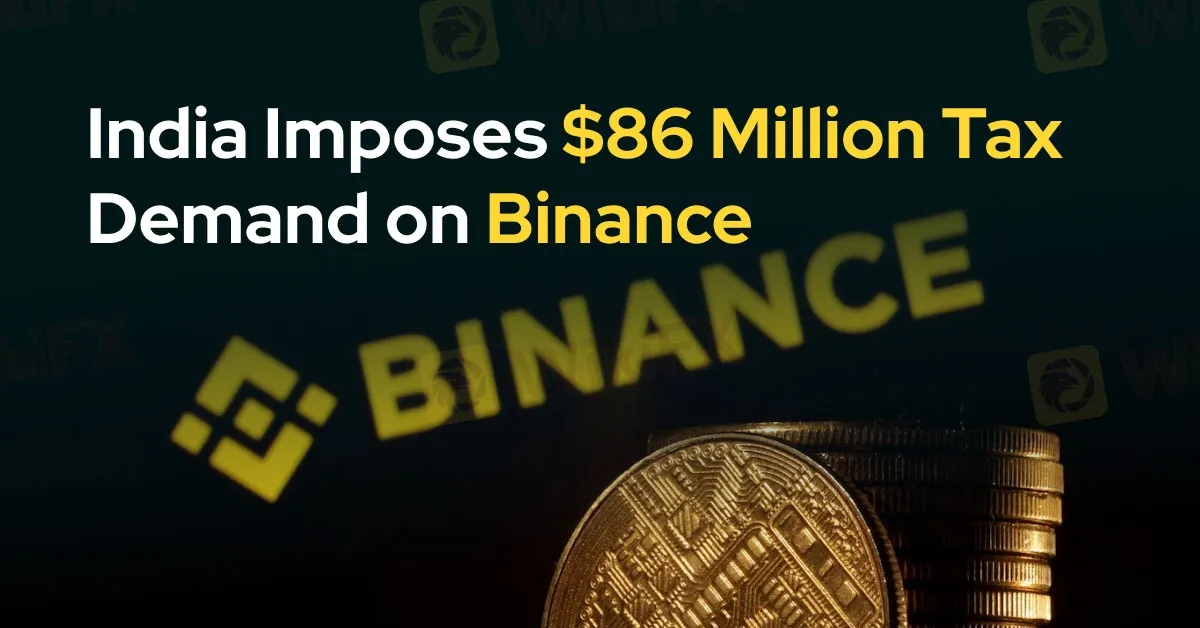简体中文
繁體中文
English
Pусский
日本語
ภาษาไทย
Tiếng Việt
Bahasa Indonesia
Español
हिन्दी
Filippiiniläinen
Français
Deutsch
Português
Türkçe
한국어
العربية
India Imposes $86 Million Tax Demand on Binance
Abstract:The Indian government is asserting its regulatory authority in the cryptocurrency sector, issuing a substantial $86 million tax demand to Binance.

The Indian government is asserting its regulatory authority in the cryptocurrency sector, issuing a substantial $86 million tax demand to Binance, the worlds leading cryptocurrency exchange. This action follows the earlier ban on Binance and other offshore exchanges in 2024 for non-compliance with Indian regulations.
In April, Binance expressed its intention to re-enter the Indian market, but this goal has encountered significant challenges. On August 6, the Directorate General of Goods and Service Tax Intelligence (DGGI) served a tax notice to Binance under the Goods and Services Tax (GST) laws. Indian authorities allege that Binance collected at least $48 million in transaction fees from Indian users, with these funds purportedly deposited in an account associated with a Seychelles-based Binance affiliate.

This tax demand marks a pivotal moment as the first instance of the Indian government targeting a cryptocurrency exchange. Initial efforts to communicate with Binance offices abroad were unsuccessful, leading to the engagement of Indian legal counsel to address the tax dispute.
The Indian governments action underscores its increased focus on regulating offshore crypto exchanges operating outside the GST framework, which imposes tax rates ranging from 5% to 28% on transactions, with additional fees for specific services.
Binances previous success in the Indian market may be partly attributed to its alleged non-compliance with local tax laws, which require a 1% tax deducted at source (TDS) on all crypto transactions. Indian regulations also mandate that crypto service providers and investors deduct a 1% TDS and levy a 30% tax on crypto investment profits. While domestic exchanges such as WazirX and CoinDCX comply with these tax requirements, many offshore exchanges have not.
Initially, Binance proposed a $2 million settlement to resolve its non-compliance and regain access to the Indian market. However, the current $86 million tax demand aims to recover the transaction fees accumulated from Indian users during Binances prior operations.
Notably, this tax demand appears to be specifically directed at Binance. Other foreign crypto exchanges, including Huobi, Kraken, and several others, have not yet received similar tax notices from Indian authorities. This situation raises questions about the future regulatory landscape for offshore crypto exchanges in India and the potential for further government actions.
This development highlights Indias intent to enforce stringent regulatory measures on the cryptocurrency market, ensuring compliance with local tax laws and protecting the integrity of its financial system. As the country continues to refine its approach to cryptocurrency regulation, the actions taken against Binance may set a precedent for how other offshore exchanges will be treated in the future.

Disclaimer:
The views in this article only represent the author's personal views, and do not constitute investment advice on this platform. This platform does not guarantee the accuracy, completeness and timeliness of the information in the article, and will not be liable for any loss caused by the use of or reliance on the information in the article.
Read more

UK Authorities Freeze Nearly $7.7 Million in Illicit Crypto Assets Within a Year
Crypto wallets tied to fraud and tax evasion were frozen under new enforcement powers granted in 2024.

Australian Authorities Joins Forces with Philippine Authorities to Combat Cyber Scams
AFP tackles cyber scam boiler rooms in the Philippines, training police to fight fraud and protect Australians from romance and cryptocurrency scams.

Steam Set to Launch Blockchain Game “Paradise” Amid Scam Allegations
“Paradise,” a blockchain-based game accused of being a crypto scam, is set for release on Steam, sparking concerns over platform’s ban enforcement and consumer risks.

Coinbase Phishing Scams Drain $46M from Users in Two Weeks
Coinbase phishing scams cost users $46M in two weeks. Learn how scammers target the crypto exchange and tips to stay safe.
WikiFX Broker
Latest News
How Crypto Trading Transforms FX and CFD Brokerage Industry
FCA Warns Against 10 Unlicensed or Clone Firms
CySEC Warns Against 14 Unlicensed Investment Websites
Top Currency Pairs to Watch for Profit This Week - March 31, 2025
Will natural disasters have an impact on the forex market?
Philippines Deports 29 Indonesians Linked to Online Scam Syndicate in Manila
Exposing the Top 5 Scam Brokers of March 2025: A Closer Look by WikiFX
Gold Prices Climb Again – Have Investors Seized the Opportunity?
Webull Launches SMSF Investment Platform with Zero Fees
Australian Regulator Warns of Money Laundering and Fraud Risks in Crypto ATMs
Currency Calculator







